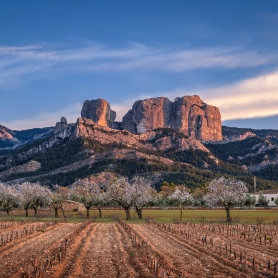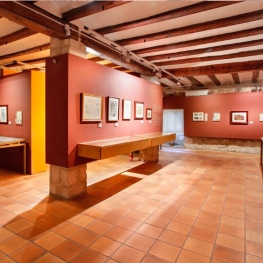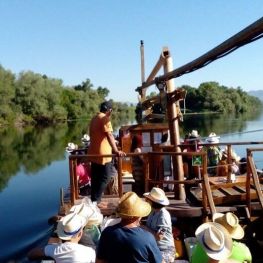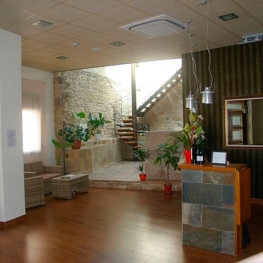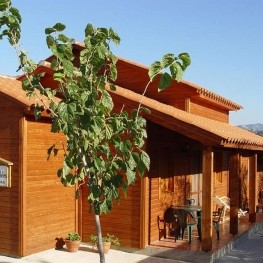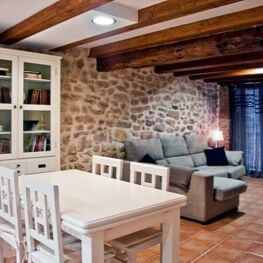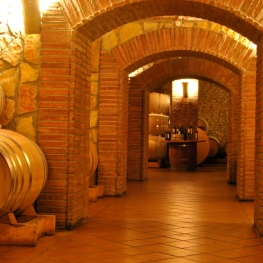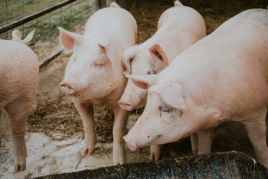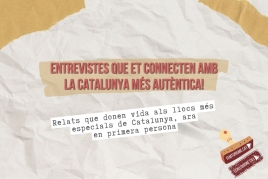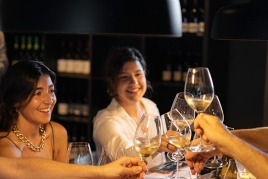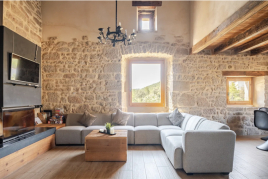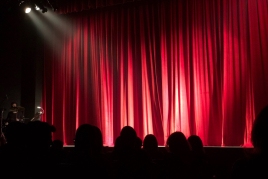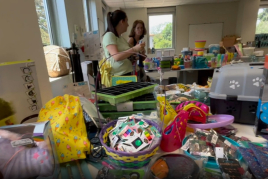Picasso's Cave
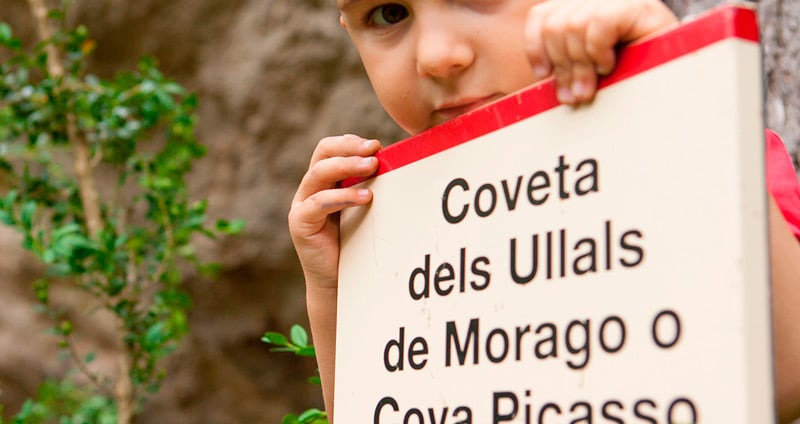
Pablo Picasso lived for a while in the ports, from June 1898 to January 1899, where he often slept in a cave with his friend, the son of Horta Manuel Pallares. Today the cave can be visited by following the path that corresponds to the itinerary marked by the Natural Park of the Ports as Picasso's cave.
Picasso's cave is an itinerary of 3.1 km, circular, low difficulty. Lasting approximately an hour, it is an ideal place for the family itinerary.
The itinerary of the leisure area of La Franqueta situated on the Estrets river. The area is easily accessible, with a good range of trails and two interpretive outdoor spaces, the mas Quiquet and the marble quarry.
On this route, we will try to guide you to get to the cave following the next itinerary. You are about?
Departure from the Franqueta
 In the municipality of Horta de Sant Joan, entering the Natural Park Ports to Estrets river valley, it is the magnificent recreational area Franqueta, situated along the river. From this point, there are different marked routes Natural Park, including this one, low difficulty but sufficiently well suited to get an idea of the natural environment and heritage of one of the most visited areas while interesting massif of the Ports . in the same population of Horta it is possible to visit the museum centers dedicated to Picasso and environment of the ports.
In the municipality of Horta de Sant Joan, entering the Natural Park Ports to Estrets river valley, it is the magnificent recreational area Franqueta, situated along the river. From this point, there are different marked routes Natural Park, including this one, low difficulty but sufficiently well suited to get an idea of the natural environment and heritage of one of the most visited areas while interesting massif of the Ports . in the same population of Horta it is possible to visit the museum centers dedicated to Picasso and environment of the ports.
The proposed route leaves the recreational area of the Franqueta. To get there from Gandesa, you must first go to Horta, either by the south through Prat de Comte the C-43 and then taking the right C-230 or by the north, Bot through the TV-3531 road and then the T-334. From Horta, exit by the T-334 road south to the junction with the T-330, which is taken to the right (SW) towards Arnes. Two hundred meters further, turn left (S / SE) and take the asphalted road of 9.5 km that leads to the starting point of the tour.
Recreation area Franqueta
 The recreation area Franqueta, owned by the municipality of Horta de Sant Joan, is situated on the river of the Estrets.
The recreation area Franqueta, owned by the municipality of Horta de Sant Joan, is situated on the river of the Estrets.
Accessed through places with interesting geological formations such as the Rock of Benet, the Gronses or Roca Llisa.
Around the recreation area we will find roads, trails and interpretive outdoor spaces that invite you to stroll by the environment. In fact, the interest of the area lies in the natural values of ecosystems that surround and traces, still visible, of human activity that took place in the valley until mid-twentieth century.
From Picasso to cave Franqueta

From the recreational area Franqueta, begins to walk about 500 meters south along the track that leads to coll de Miralles.
 Shortly after appearing on the left (NE), a staircase made of logs indicating the trailhead to the Picasso cave. After the first few meters of climb it is an old lime kiln, buildings that stood where they could find limestone outcrops for by long cooking, to make lime for use as cement in construction. Sheltered by pines and oaks, you get to the left bank of the Estrets.
Shortly after appearing on the left (NE), a staircase made of logs indicating the trailhead to the Picasso cave. After the first few meters of climb it is an old lime kiln, buildings that stood where they could find limestone outcrops for by long cooking, to make lime for use as cement in construction. Sheltered by pines and oaks, you get to the left bank of the Estrets.
Once near the river of Estrets. Continue along the path to the right (E) and passed a few meters Barrina the source.
Having traced the river, after one kilometer, a sign pointing to the right, the situation of the cave Ullals (Fangs) of Morago is a small cave popularly known as cave Picasso due to stay this renowned painter made the summer of 1898. recovers the main trail to the right and access to the river of Estrets, where we found a wooden bridge.
The cave Ullals of Morago or cave Picasso
 The cave Ullals of Morago is also known as the Cave of Picasso, as when Picasso was 16, in the summer of 1898, he spent a few weeks in this small cave.
The cave Ullals of Morago is also known as the Cave of Picasso, as when Picasso was 16, in the summer of 1898, he spent a few weeks in this small cave.
He did, in the company of his friend Pallares, son of Horta and his companion in the Llotja of Barcelona who had invited him there. For the artist was unforgettable and, in fact, he returned to Horta few years later, in 1909. From his stays works that reproduce the landscapes and characters Ports are preserved.
Cave Picasso to Franqueta
 We found the wooden bridge over the river of Estrets and track up the valley Uixó. You have to cross it and turn left (NO) by this track, and turning to the recreation area. Shortly later, turn right (NE) by a deviation that leads to old marble quarry restored in an exemplary manner, which is 30 minutes. Interpretation panels explain how were extracted marble blocks and can also see the exact places where they worked and the marks left in the work of extraction. The farm dates back to 1966 and was stopped due to opposition from the local population. the access road melts and returns to the track that goes down along the river.
We found the wooden bridge over the river of Estrets and track up the valley Uixó. You have to cross it and turn left (NO) by this track, and turning to the recreation area. Shortly later, turn right (NE) by a deviation that leads to old marble quarry restored in an exemplary manner, which is 30 minutes. Interpretation panels explain how were extracted marble blocks and can also see the exact places where they worked and the marks left in the work of extraction. The farm dates back to 1966 and was stopped due to opposition from the local population. the access road melts and returns to the track that goes down along the river.
 Once you found the signs to the Mas de Quiquet, continue to the right (N) and climb a few meters, you come to this but also beautifully renovated, which makes the role of social facilities for different purposes. It is closely linked to Picasso's stay in the massif of the Ports with Manuel Pallares, during August 1898, outside panels that explain what has been the evolution of the landscape in ports and two samples of the intense activity was found: there is reproduced a coal, used for oak charcoal and also have reconstructed a hole hits pits hits were works for the extraction of the paste of pine, a material used formerly for the waterproofing of the crest. ship and wine barrels.
Once you found the signs to the Mas de Quiquet, continue to the right (N) and climb a few meters, you come to this but also beautifully renovated, which makes the role of social facilities for different purposes. It is closely linked to Picasso's stay in the massif of the Ports with Manuel Pallares, during August 1898, outside panels that explain what has been the evolution of the landscape in ports and two samples of the intense activity was found: there is reproduced a coal, used for oak charcoal and also have reconstructed a hole hits pits hits were works for the extraction of the paste of pine, a material used formerly for the waterproofing of the crest. ship and wine barrels.
 After passing through the Mas de Toni, distinguished with the nice but the Franqueta, the last inhabited but the Natural Park dels Ports. Continue down the trail.
After passing through the Mas de Toni, distinguished with the nice but the Franqueta, the last inhabited but the Natural Park dels Ports. Continue down the trail.
After 3 km you reach the starting point of the itinerary, in the recreation area of the Franqueta. And so we reach the end of the route.
Horta footprint Picasso
 It is evident that the stay that made Picasso in Horta marked a before and after in the artist 's work and, in fact, he recognized a few years later saying that "everything I know I learned in the village in Pallarès "referring obviously in Horta de Sant Joan.
It is evident that the stay that made Picasso in Horta marked a before and after in the artist 's work and, in fact, he recognized a few years later saying that "everything I know I learned in the village in Pallarès "referring obviously in Horta de Sant Joan.
In fact, the artist makes it clear with works such as the Mas d'en Quiquet. This is an oil painting on canvas made the same year of his stay in Horta, in 1898, and which shows evidently the study He made the rural environment and landscape that makes his works appear containing a large theme and chromatic naturalism with freedom of line and brushstroke.
It is at this time when Picasso left behind, definitely, severe academic rules and provides a warm and cool the atmosphere more than Quiquet with a new and changing chromaticity and luminosity.
Manuel Pallarès
 Manuel Pallares and Grau was born in Horta de Sant Joan. He devoted himself to painting following an academic and independent style.
Manuel Pallares and Grau was born in Horta de Sant Joan. He devoted himself to painting following an academic and independent style.
Despite being much older than him, Pallarès became the best friend of Picasso who agreed on the Llotja of Barcelona in 1895 and who was after school for drawing at night. And it was also in the Guildhall, where he became assistant José Ruiz Blasco, Picasso 's father.
Of friendship between the two artists, they go out two drawings and an oil portrait, which in turn became one of the first works by Picasso in Barcelona.
Their friendship was maintained over the years, even Picasso welcomed Manuel Pallarès when he was older at home, although the distance as Picasso wanted to get away from all that symbolize old age for him was synonymous decay, disease and death.
The landscape of geniuses
 The Landscape of Genis is a tourist proposal to discover the essence of the landscape of Costa Dorada and the River Ebro that inspired the work and personality of the four great universal genius Antoni Gaudi, Joan Miró, Pau Casals and Pablo Picasso.
The Landscape of Genis is a tourist proposal to discover the essence of the landscape of Costa Dorada and the River Ebro that inspired the work and personality of the four great universal genius Antoni Gaudi, Joan Miró, Pau Casals and Pablo Picasso.
You can find more information on elpaisatgedelsgenis.cat.
What to do
Museu Centre Picasso a Horta de Sant Joan
Horta de Sant JoanThe Picasso Center in Horta is a permanent tribute to Picasso. Its…
Where to eat
Restaurant Hotel Nou Moderno
Vilalba dels Arcs (a 19.8 Km)Hotel restaurant to enjoy the tranquility of Terra Alta and try the…
Where to sleep
Apartaments Les Valletes
Arnes (a 6.5 Km)Les Valletes Apartments are located in Arnes, a charming municipality in the…
Ca la Leonor
Bot (a 8.1 Km)Rural house from 1880, renovated in 2012, preserving the original wooden beams…
Restaurant Hotel Nou Moderno
Vilalba dels Arcs (a 19.8 Km)Hotel restaurant to enjoy the tranquility of Terra Alta and try the…
Enoturisme Celler Piñol
Batea (a 15.3 Km)Celler Piñol is a family winery located in Batea, dedicated to producing…


